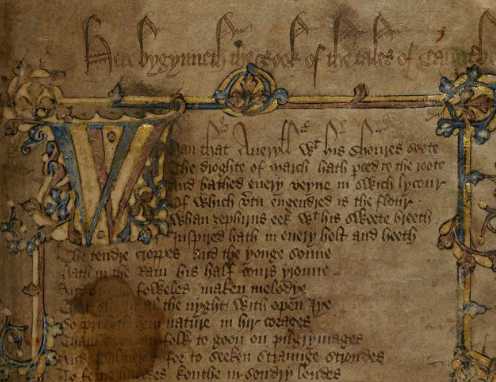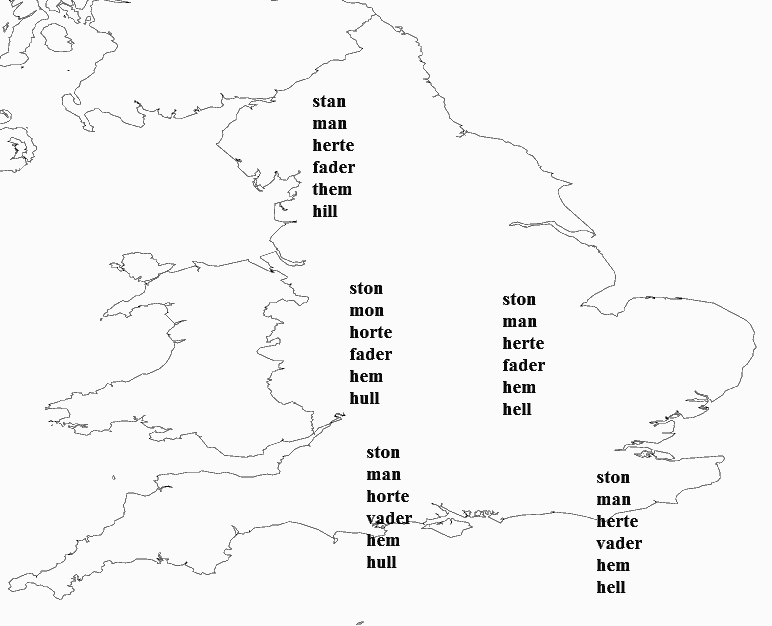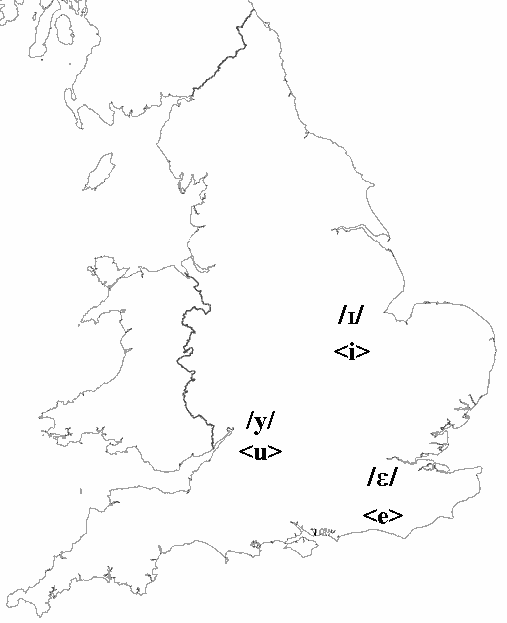I. 515通りの through --- 中英語のスペリング

2018年10月28日 大阪慶友会(ドーンセンター)
堀田 隆一
「hellog〜英語史ブログ」 url: http://user.keio.ac.jp/~rhotta/hellog/
多くの英語学習者にとって,英語のスペリングは,不規則で例外ばかりの暗記を強いる存在と映る.なぜ busy は「ブズィ」ではなく「ビズィ」と発音するのか.なぜ doubt というスペリングには,発音しない <b> のような文字があるのか.
しかし,不合理に思われるこれらのスペリングの各々にも,なぜそのようなスペリングになっているかという歴史的な理由が必ず存在する.個々の単語のスペリングの「なぜ?」に納得のゆく説明を与えてきたい.
although, among, answer, are, aunt, autumn, blood, build, castle, clerk, climb, colour, comb, come, cough, could, course, debt, do, does, done, dough, eye, friend, gone, great, have, hour, island, journey, key, lamb, listen, move, none, of, once, one, only, own, people, pretty, quay, receive, rough, said, salt, says, shoe, shoulder, some, sugar, talk, two, was, water, were, where, who, you

| 1066年 | ノルマン人の征服 |
| 12--13世紀 | 英語の文学作品などが現れ始める( Layamon's Brut, The Owl and the Nightingale, Ancrene Wisse, etc. ) |
| 1258年 | Simon de Monfort の反乱(政府機関へのフランス人の登用に対する抗議.英語の回復も強く要求される.その結果,Henry III は布行政改革の宣言書をラテン語,フランス語だけでなく英語でも出すこととなった.) |
| 1272年 | Edward I がイングランド王として初めて英語を使用する |
| 1337年 | Edward III,フランスの王位継承権を主張し百年戦争が始まる( 〜 1453年 ) |
| 1348--50年 | 最初のペストの流行( 1361--62, 1369, 1375年にも流行) |
| 1350年代 | Higden's Polychronicon で,上流貴族の子弟にとってもすでに英語が母語となっていたことが示唆される |
| 1356年 | 地方裁判所の記録が英語になる |
| 1362年 | 議会の開会が英語で宣言される |
| 1363年 | 法廷での使用言語が英語となる (ただし、記録はラテン語) |
| 1380年代 | ロンドンのギルドが記録に英語を使い始める |
| 1381年 | 農民一揆 |
| 1384年 | ロンドンのシティーが英語で布告を出す |
| 1399年 | 英語を母語とする最初の王 Henry IV 即位 |
| 1414年 | Henry V がイングランド王として初めて英語で手紙を書く(政府内でも英語の使用が奨励される) |
| 1422年 | ロンドンの醸造業者が手続きをラテン語から英語にする |
| 1453年 | 百年戦争の終結 |
| 1488年 | 英語が法的文書の書き言葉として認められる |
doruȝ-, dorw, dorwe, dorwgh, dourȝh, drowgȝ, durghe, durwe, -thogh, thorch, thorew, thorewe, thorffe, thorg, Thorgh, thorgh, -thorgh, thorgh, thorghe, thorght, thorghw, thorghwe, thorgth, thorh, thoro, thorogh, thoroghe, thoroght, -thoroght, thorohe, thoroo, thorou, Thorough, thorough, thorough-, thoroughe, thorought, Thorouh, thorouȝ, thorouȝh, Thorow, thorow, thorow-, Thorowe, thorowe, thorowg, thorowgh, thorowghe, thorowght, thorowh, thorowth, thorowut, thorowȝ, thorowȝt, thorrou, thorrow, thorth, thorthe, thoru, thoru-, thorue, thorugh, -thorugh, thorughe, thorught, -thorught, Thoruh, thoruh, thoruh-, thorur, thoruth, Thoruȝ, thoruȝ, thoruȝh, thorv, Thorw, thorw, -thorw, thorw, Thorwe, thorwe, thorwgh, thorwh, thorwȝ, -thorwȝ, thorwȝ, thorwȝe, Thorȝ, thorȝ, Thorȝe, thorȝe, thorȝh, thorȝoh, thorȝt, thorȝw, thorȝwe, thour, thour, thoure, thourgh, -thourgh, thourghe, thourght-, thourh, thourhe, thourow, thourr, thourth, thourw, thourw, thourwg, thourȝ, thourȝ, thourȝe, thow, thowe, thowffe, thowr, thowrgh, thowrow, thowur, thrawth, threw, thro, thro-, -thro, throch, throcht, throgh, throghe, throghet, throght, throght, throghte, throighe, throu, throuche, throue, throug, through, through-, throughe, throught, throuh, throuȝ, throuȝe, throuȝht, throve, throw, throw-, throw, throwe, throwe, throwe, throwg, throwgh, throwght, throwh, throwr, throwth, throwȝ, throwȝe, throȝ, -throȝe, throȝe, throȝgh, throȝghe, throȝh, throȝhe, throȝt, thruch, thrue-, thrug-, Thrugh, thrugh, thrughe, thrught, thrughte, thruh, thruth, thruȝ, thruȝe, thruȝhe, thrvoo, thrw, thrwe, thrwgh, thrwght, thrygh, thuht, thur, thurch, thurew, thurg, thurge, thurge-, thurgeh, Thurgh, thurgh, thurgh-, -thurgh, thurgh, thurghe, thurght, thurghte, thurgth, thurgwe, Thurh, thurh, thurhe, thurhge, thurhgh, thuro, thurow, thurowe, thurth, thurthe, thuru, thurv, thurw, -thurw, thurwe, Thurȝ, thurȝ, thurȝe, Thurȝh, thurȝh, Thurȝhg, thurȝt, thurȝth, thwrgh, thwrw, torgh, torghe, torw, -torwe, trghug, trogh, troght, trough, trow, trowe, trowffe, trowgh, trowght, trugh, trughe, trught, twrw, yerowe, yhorh, yhoru, yhrow, yhurgh, yhurght, yora, yorch, yorgh, yorghe, yorh, yoro, yorou, yoroue, yorough, yorour, yorow, yorow-, yorowe, yorowe, yoru, yorugh, yoruh, yoruȝ, yorw, yorwe, yorȝ, your, yourch, yourgh, yourghe, yourh, yourw-, yourȝ, yowr, yowrw, yoȝou, yrogh, yrou-, yrow, yrugh, yruȝ, yurch, yurg-, yurgh, yurghe, yurght, yurh, yurhg, yurht, yurowe, yurth, yurthe, yuru, yurw, yurwh, yurȝ, yurȝe, ðoru, þarȝ, þerew, þerew, þerow, þerue-, þhorow, þhurȝ, þor, þorch, þore, þoreu, þorew, þorewe, þorewȝ, þoreȝ, þorg, -þorgh, þorgh, þorghe, þorght, þorghȝ, þorguh, þorgȝ, þorh, þoro, þorogh, þoroghe, þorou, þorou, þoroue, þorough, þorought, þorouh, þorour, -þorouȝ, þorouȝ, þorouȝe, þorouȝh, þorouȝt, þorow, -þorow, þorow, þorow, þorowe, þorowgh, þorowghe, þorowh, þorowth, þorowþ, þorouwȝ, þoroȝ, þorrow, þorrughe, þorth, þoru, -þoru, þorue, þorug, þorugh, þorught, þorugȝ, þoruh, þoruhg, þoruth, þoruþ, þoruȝ, -þoruȝ, þoruȝe, þoruȝh, þoruȝt, þorv, þorw, þorw-, -þorw, þorwe, þorwgh, þorwgȝ, þorwh, -þorwh, þorwhe, þorwth, þorwtȝ, þorwȝ, þorwȝe, þorþ, þorȝ, þorȝe, þorȝh, þorȝhȝ, þorȝt, þough, þour, þour, þour, þourg, þourgh, þourght, þourgȝ, þourh, þourh, þourow, þourt, þourth, þouruȝ, þourw, þourw-, -þourw, þourwe, þourþ, þourȝ, t-þourȝ, þourȝ, þourȝe, þourȝh, þourȝt, þourȝw, þouȝ, þouȝt, þowr, þowre, þro, þrogh, þroghe, þrorow, þrorowe, þroth, þrou, þrough, þrought, þroughte-, þrouh, þrouhe, þrouht, þrouȝ, þrouȝe, þrouȝh, þrouȝt, þrouȝte, þrouȝth, þrow, þrow, þrowe, þrowgh, þrowghe, þrowh, -þrowþ, þrowȝ, þrowȝe, þroȝ, þroȝe, þroȝgh, þroȝh, þroȝt, þroȝth, þrugh, -þruh, þruȝ, þruȝe, þur, þurch, þureh, þureȝ, þurf, þurg, þurgh, -þurgh, þurghe, þurght, þurghȝ, þurgȝh, þurh, þurh, þurhg, þurht, þuro, þurow, þurru, þurth, þurthe, þuru, þuruch, þurugh, þurughe, þurut, þuruȝ, þurw, þurw-, þurwe, þurwȝ, þurwȝ, þurþ, þurȝ, þurȝe, þurȝg, þurȝh, þurȝhg, þurȝt, þurȝth, þwrgh, ȝorgh, ȝoru, ȝoruȝ, ȝoruȝt, ȝorw, ȝour, ȝowr, ȝurch
Q: こんなに様々なスペリングがあって不便じゃないの?
A: 交通もメディアも未発達な当時,方言境界をまたいで英語の書き言葉が行き交う機会は多くなかったので,スペリングも「ローカル」で事足りたのです.また,そのような機会があったとしても,方言の発音をしばらく聞いていれば耳が慣れてくるように,方言のスペリングもしばらく見ていれば目が慣れてくるものです.さらに実際のテキストでは文脈があるので,他の語と間違える心配もそれほどありません.
現代人は標準的な書き言葉があることを前提としており,それがなければ不便だろうと思いがちですが,標準がないならばないで,意外とやっていけるのです.


| 古英語形 | 南西部・中西部方言形 | 北部・東中部方言形 | 南東部方言形 |
|---|---|---|---|
| /y/ | /ɪ/ | /ɛ/ | |
| bysig "busy" | busy | bisy | besy |
| byrgan "bury" | bury | biry | bery |
| myrge "merry" | murie | myry | mery |
| cynn "kin" | kun | kin | ken |
| lystan "lust" | luste(n) | liste(n) | leste(n) |
| synn "sin" | sunne | synne | senne, zenne |
Q: なぜ "busy" では,発音とスペリングの標準が各々異なる方言から選択されたの?
A: 1つには,当時は読み書きできる人が現代よりもずっと少なかったという事情があります.読み書きできるエリートとできない一般庶民は,異なる階級に属しており,生きる世界が異なっていました.エリートは主に書き言葉の世界に影響力をもち,一般庶民は話し言葉の世界を支える存在でした.そして,スペリングと発音もまた生きる世界が異なっており,交わる機会がなかったのです.
現代人は,発音とスペリングをペアリングさせる習慣に馴染んでいますが,当時は両者は別個の存在でした.発音とスペリングの標準化も独立して進行し,後で振り返ってみたら合致してなかった,というわけです.
| Whan that Aprill with his shoures soote | |
| The droghte of March hath perced to the roote, | |
| And bathed every veyne in swich licour | |
| Of which vertu engendred is the flour; | |
| 5 | Whan Zephirus eek with his sweete breeth |
| Inspired hath in every holt and heeth | |
| The tendre croppes, and the yonge sonne | |
| Hath in the Ram his half cours yronne, | |
| And smale foweles maken melodye, | |
| 10 | That slepen al the nyght with open ye |
| (So priketh hem nature in hir corages), | |
| Thanne longen folk to goon on pilgrimages, | |
| And palmeres for to seken straunge strondes, | |
| To ferne halwes, kowthe in sondry londes; | |
| 15 | And specially from every shires ende |
| Of Engelond to Caunterbury they wende, | |
| The hooly blisful martir for to seke, | |
| That hem hath holpen whan that they were seeke. |
| 15世紀初期 | |
|---|---|
| El | The tendre croppes / and the yonge sonne |
| Ha4 | The tendre croppes and þe ȝonge sonne |
| Hg | The tendre croppes / and the yonge sonne |
| La | The tendre croppes 7 þe ȝonge sonne . |
| 15世紀前期 | |
| Bo2 | The tendre Croppes and the yong sonne |
| En1 | The tendre croppes and' the yonge son |
| Ii | The tendre croppes and the yong sonne |
| Lc | The tendir croppis 7 þe yonge sonne |
| Ps | The tendre croppes and the yong sonne |
| Pw | The tendre croppis 7 þe yonge sonne |
| Ry2 | The tendre croppes 7 the ȝonge sonne |
| 15世紀中葉 | |
| Mg | The tendre croppes / and the yonge sonne |
| 15世紀後期 | |
| Ch | The tendre Croppes . and the yonge sonne |
| Ds1 | The tender croppis 7 the yong' sonne |
| Fi | The tender croppes and þe yonge sonne |
| Ha2 | The tendre croppes . 7 the yong sonne . |
| Ha3 | The tendre croppys . And þe yownge sonne |
| Ht | The tendre croppes and the yong' sonne |
| Ld1 | The tendre croppes and the yong sonne |
| Ph2 | The tendir croppis and the yong Sūne |
| Py | The tendre croppis . and the yong' sonne |
| Se | The tendre croppis / 7 the yonge sonne |
| Tc1 | The tendre croppis and th yong sonne |
| To1 | the tendre Croppis . and the yonge sonne |
| 15世紀末期 | |
| Ad1 | The tendre croppys / and the yong sonne |
| Bo1 | The tendir croppis and the yong Sūne . |
| Cx1 | The tendir croppis / and' the yong sonne |
| Cx2 | The tendyr croppis / and' the yong' sonne |
| En3 | The tendre croppis and the yonge sonne |
| Ld2 | The tendre croppys and the yong sōne . |
| Ma | ¶ The tenþir Croppis . and' þe yonge son |
| Pn | The tendre croppes and the yong sonne |
| Tc2 | The tendre croppes / and the yonge sonne |
| Wy | The tendre croppys and the yonge sonne |


A Table Alphabeticall, conteyning and teaching the true vvriting, and vnderstanding of hard vsuall English wordes, borrowed from the Hebrew, Greeke, Latine, or French. &c.
With the interpretation thereof by plaine English words, gathered for the benefit & helpe of Ladies, Gentlewomen, or any other vnskilfull persons.
一見不合理な英単語のスペリングは,すべて歴史の産物である.およそ歴史的に説明できる.
現代人が当然視している「標準的なスペリング」は,完成してからたかだか250年しか経っていない.標準があるということは,普遍的なことや当たり前のことではなく,近現代特有の歴史的な現象である.